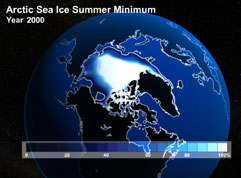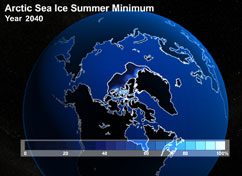Earth may be near global warming tipping point
Earth may be near global warming tipping point
mongabay.com
March 15, 2007
Earth could be reaching a tipping point that could trigger rapid climate change according to scientists studying declining sea ice in the Arctic.
While little is known about the exact cause of Arctic sea ice decline, some models predict there could be a seasonally ice-free Arctic by the year 2100. A new study published in the journal Science links this decline to “rising concentrations of greenhouse gases and strong natural variability in Arctic sea ice” and suggests that change could be more rapid and wide-ranging than some expect.
“When the ice thins to a vulnerable state, the bottom will drop out and we may quickly move into a new, seasonally ice-free state of the Arctic,” said Mark Serreze, a senior research scientist at CU-Boulder’s National Snow and Ice Data Center and lead author of the study. “I think there is some evidence that we may have reached that tipping point, and the impacts will not be confined to the Arctic region.”
Serreze says that change in the Arctic could have global effects, reducing rainfall in the American West, increasing rainfall in western and southern Europe in winter and strengthening “mid-latitude” storms.
  The image from 2000, based on simulations produced by the Community Climate System Model, shows the approximate extent of Arctic sea ice in September. The model indicates the extent of this late-summer ice could begin to retreat abruptly within several decades (top). By about 2040, the Arctic may be nearly devoid of sea ice during the late summer unless greenhouse gas emissions are significantly curtailed (bottom). Courtesy of UCAR, the graphic appeared in a story that reported on a Geophysical Research Letters study that projected sea ice-free summers in the Arctic by 2040. |
“Just how things will pan out is unclear, but the bottom line is that Arctic sea ice matters globally,” he noted.
Serreze says that rising temperatures due to anthropogenic emissions of greenhouse gases put Arctic sea ice at greater risk of natural fluctuations.
“While the Arctic is losing a great deal of ice in the summer months, it now seems that it also is regenerating less ice in the winter,” said Serreze. “With this increasing vulnerability, a kick to the system just from natural climate fluctuations could send it into a tailspin.”
“Given the growing agreement between models and observations, a transition to a seasonally ice-free Arctic Ocean as the system warms seems increasingly certain,” the authors wrote. “The unresolved questions regard when this new Arctic state will be realized, how rapid the transition will be, and what will be the impacts of this new state on the Arctic and the rest of the globe.”
Related articles
Global warming could make Arctic sea ice-free by 2040. Global warming is causing an abrupt retreat in Arctic sea ice that could leave the Arctic Ocean with ice-free summers by 2040 according to research published in the December 12 issue of Geophysical Research Letters. A team of scientists from the National Center for Atmospheric Research (NCAR), the University of Washington, and McGill University used computer modeling to forecast the impact of greenhouse gas emissions on the Arctic. The models indicated that “the extent of sea ice each September could be reduced so abruptly that, within about 20 years, it may begin retreating four times faster than at any time in the observed record,” according to a statement from NCAR.
Arctic sea ice levels fall. Arctic sea ice fell to the fourth lowest level on record according to researchers at the University of Colorado at Boulder. CU-Boulder Research Professor Mark Serreze of the National Snow and Ice Data Center Sea said that sea ice is declining at about 8.6 percent per decade, or at about 23 million square miles per year. Serreze said that this year would have likely been a record had it not been for cool August temperatures.
Arctic ice melting rapidly, polar bears suffering – new research. New research shows that Arctic sea ice is rapidly disappearing. Scientists say that the human-induced buildup of greenhouse gases in the atmosphere is a leading culprit behind the decline. According to a study to be published in the journal Geophysical Research Letters this month, the maximum amount of sea ice in the Arctic winter has fallen by six percent over each of the last two winters, while summer sea ice continues to retreat at an average of ten percent per decade.
This article is based on a news release from University of Colorado at Boulder.